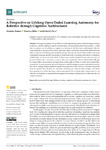Mostrar o rexistro simple do ítem
A perspective on lifelong open-ended learning autonomy for robotics through cognitive architectures
| dc.contributor.author | Romero, Alejandro | |
| dc.contributor.author | Bellas, Francisco | |
| dc.contributor.author | Duro, Richard J. | |
| dc.date.accessioned | 2023-04-14T10:10:27Z | |
| dc.date.available | 2023-04-14T10:10:27Z | |
| dc.date.issued | 2023-02-02 | |
| dc.identifier.citation | Romero, A.; Bellas, F.; Duro, R.J. A Perspective on Lifelong Open-Ended Learning Autonomy for Robotics through Cognitive Architectures. Sensors 2023, 23, 1611. https://doi.org/10.3390/s23031611 | es_ES |
| dc.identifier.issn | 1424-8220 | |
| dc.identifier.uri | http://hdl.handle.net/2183/32874 | |
| dc.description.abstract | [Abstract]: This paper addresses the problem of achieving lifelong open-ended learning autonomy in robotics, and how different cognitive architectures provide functionalities that support it. To this end, we analyze a set of well-known cognitive architectures in the literature considering the different components they address and how they implement them. Among the main functionalities that are taken as relevant for lifelong open-ended learning autonomy are the fact that architectures must contemplate learning, and the availability of contextual memory systems, motivations or attention. Additionally, we try to establish which of them were actually applied to real robot scenarios. It transpires that in their current form, none of them are completely ready to address this challenge, but some of them do provide some indications on the paths to follow in some of the aspects they contemplate. It can be gleaned that for lifelong open-ended learning autonomy, motivational systems that allow finding domain-dependent goals from general internal drives, contextual long-term memory systems that all allow for associative learning and retrieval of knowledge, and robust learning systems would be the main components required. Nevertheless, other components, such as attention mechanisms or representation management systems, would greatly facilitate operation in complex domains. | es_ES |
| dc.description.sponsorship | Ministerio de Ciencia e Innovación; PID2021-126220OB-I00 | es_ES |
| dc.description.sponsorship | Xunta de Galicia; EDC431C-2021/39 | es_ES |
| dc.description.sponsorship | Consellería de Cultura, Educación, Formación Profesional e Universidades; ED431G 2019/01 | es_ES |
| dc.language.iso | eng | es_ES |
| dc.publisher | MDPI | es_ES |
| dc.relation | info:eu-repo/grantAgreement/EC/HE/101070381 | es_ES |
| dc.relation.uri | https://doi.org/10.3390/s23031611 | es_ES |
| dc.rights | Attribution 4.0 International (CC BY 4.0) | es_ES |
| dc.subject | Open-ended learning | es_ES |
| dc.subject | Lifelong learning | es_ES |
| dc.subject | Cognitive architectures | es_ES |
| dc.subject | Autonomous robots | es_ES |
| dc.title | A perspective on lifelong open-ended learning autonomy for robotics through cognitive architectures | es_ES |
| dc.type | info:eu-repo/semantics/article | es_ES |
| dc.rights.access | info:eu-repo/semantics/openAccess | es_ES |
| UDC.journalTitle | Sensors | es_ES |
| UDC.volume | 23 | es_ES |
| UDC.issue | 3 | es_ES |
| dc.identifier.doi | https://doi.org/10.3390/s23031611 |
Ficheiros no ítem
Este ítem aparece na(s) seguinte(s) colección(s)
-
CIT-GII - Artigos [38]
-
OpenAIRE [314]






